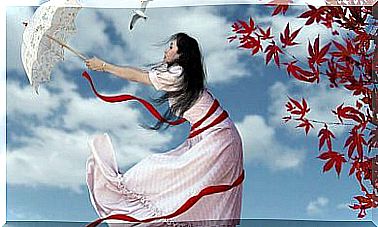Namasté, What Does It Mean?

Namasté is one of those words endowed with a message as beautiful as it is enriching. Those who practice yoga on a regular basis will already be more than used to saying this expression at the end of the class. We are facing an original word from Sanskrit that enjoys great spiritual significance in Asian cultures … but what does it mean?
The truth is that there are many concepts that only make sense in their native languages. Given the complexities of Sanskrit itself, it is not at all easy to symbolize in another language all that kaleidoscope of meanings, images, intentions and religiosity contained in the word namaste. We could say that as the etymological roots reveal, “nam” and “te”, the translation will be something like ‘I greet you’ or ‘I revere myself before you’.
However, it is much more. There is something divine, there is an ethical and kind connotation, there is a spiritual and also religious veil … Few words contain so much power in each of their letters.

A very archaic origin
The origins of the word namaste are very remote. We are talking about the ancient Hindu culture, immensely varied in terms of religious practices, dialects, traditions, etc. One of the many languages spoken in India is Sanskrit, considered a sacred language, an almost perfect language according to linguists. Its grammar is admirable, and until not long ago it was the vehicle of expression and communication between Brahmin religious leaders and scholars.
Also, the term “Sanskrit” means something like “perfectly done.” Even in some parts of South Asia, namaskar is used as a synonym to address the elderly.
Hindus use the word namaste as a form of greeting and farewell. It also serves to give thanks, to ask permission, to offer respect …
Etymological roots
Let us now go into the etymology of this ancient word. To begin with, it must be said that as we have already pointed out at the beginning, namaste is a compound word.
The term ‘namas’ means ‘greeting’ or ‘reverence’, and it comes etymologically from nam, which means ‘prostrate’ or ‘bow down’. For its part, the suffix “te” is a personal pronoun, quite similar to the equivalent in Spanish, by the way, which means “to you.”
So if we put both meanings together, we find out that namaste would mean something like ‘I greet you’ or ‘I revere you’. However, the meaning of this word is not exhausted here …
The meanings of Namasté
Let’s go beyond the strictly semantic aspect of the word namaste . To understand its meaning we must delve into the philosophical-spiritual universe that Sanskrit possesses. Let’s see them.
- The term “namas” can also be interpreted as “nothing mine.” Therefore, this word would also come to symbolize the importance of putting aside the ego in an attitude of humility in front of the other. If this greeting is done from the heart, a genuine connection is established between people. An aspect that goes beyond expectations and social masks.
- When we pronounce the word namaste, we generally accompany it with a gesture, a “mudra”. The person gathers the palms of their hands in the shape of a prayer and brings them to the center of the chest, right to the heart chakra.
- That position, and according to Buddhism, allows us to rest and make our energy flow to be in harmony with the world.
- There is another nuance to the spiritual meaning of this multifaceted word. We refer to the belief that there is a divine spark in each person . So when the word namaste is accompanied by the gesture, or mudra, we are acknowledging the divine presence in oneself in the other. If we put it into words, it would be something like: “The divine spark in me recognizes the divine spark in you”
Also, there is a component more attributed to the word namaste . It is that where it is symbolized that “your spirit and mine are one”. We are all connected, we are all part of the universe. What makes you happy makes me happy. What affects you affects me.

Namaste and yoga
In yoga classes it is very common for the word namaste to appear at the end, as a farewell. However, the ideal would be for the practice to also begin with the introduction and preparation as a form of reception, of welcoming, where to impregnate in the other that sense of openness, kindness and sincere reception.
However, because by the end of the class the mind and environment are more serene, yoga instructors generally prefer to say this mantra when the energy is most conducive. That is, when we are more relaxed and we have exercised our body to calm our spirit.
Practice Namasté to transform your life
In this western world where we live in a hurry, stressed and anxious, we hardly take the time to properly greet the people we pass each day. Although it seems silly, this small gesture can influence the way we relate and experience day to day.
That said, we invite you to say hello keeping in mind the meaning and purpose of namaste . So you can:
- Improve your personal relationships by honoring and respecting the other. Well, namaste implies recognizing the best in yourself and the best in the other. You start, from the moment you greet, to treat others as you like to be treated. You respect your being as you respect all beings.
- Be more positive by seeing the beauty that is within each person. Since it invites us to focus on the best that is within each person with whom we interact.
- Stop judging and be more compassionate. Instead of just reacting by generating negative emotions and responses when feeling attacked or hurt by what someone tells you, you will begin to see everything from a higher consciousness. Perhaps that person who is speaking to you is suffering, is afraid or is sad. Responding with a namaste will generate a love response rather than a negative reaction.
- Become more meditative and you will contribute to creating a better world. When we say namaste we honor the place in the other, in which the entire universe dwells, where love, truth, light and peace dwell.
From now on, dear reader, when you hear or say the word namaste , remember that, according to this ancient culture, you will be consciously participating in the process of spiritual evolution that this very special word seeks to stimulate within you.
With the pronunciation of this word, accompanied by its particular gesture, you will convey that your desire is to promote a real encounter, impregnated with respect for the other person, regardless of race or age, since namasté only understands from being.









